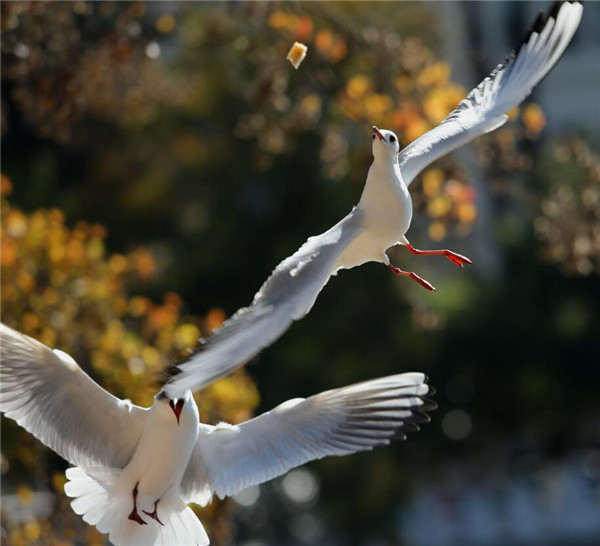Wintering gulls keep date with China's spring city
Keeping a tryst of more than 30 years, over 40,000 migratory black-headed gulls flew thousands of kilometers from far-off lands this winter to Kunming, capital of southwest China's Yunnan Province, known as the "Spring City" for its balmy weather.

The sudden outbreak of the novel coronavirus that has emptied public places, however, has made this year's reunion rather different, as Dianchi Lake and other popular habitats for the birds have been closed to the public since Jan. 27 to contain the epidemic.
Amid the fight against the virus, worries over these migratory hardy souls continue to mount, after all, residents used to provide the gulls with one of their primary sources of food.
Since Jan. 27, the municipal bureau of forestry and grassland of Kunming has organized staff to carry more than 1,000 kg of food daily to habitats of the gulls, feeding the birds twice a day to make sure they survive the winter.
Wearing masks and protective suits, Zhang Qiang and his colleagues feed the birds in Dianchi Lake, one of the largest freshwater lakes on the Yunnan-Guizhou Plateau, every morning and afternoon.

"Many people are concerned the gulls will starve or lose weight," said Zhang, a worker of the national tourism resort of Dianchi Lake.
With people's love and care, the number of wintering black-headed gulls in Kunming has risen from hundreds in the 1980s to more than 40,000 in recent years.
"The gulls are old friends of Kunming," said Zhao Xuebing, secretary-general of the Kunming Ornithological Society, adding that the red-billed oceanic birds have continuously migrated through Siberia and other regions to spend winter months in the spring city since around 1985.
"Kunming is an ideal place for migratory birds, with its mild weather, abundant food sources such as fish and shrimp in their habitats and food provided by residents," Zhao said.

A total of 40,800 black-headed gulls have been detected in over 60 habitats in the city, according to a survey in December conducted by the local forestry department.
Wang Zijiang, a professor at Yunnan University, was among the first batch of scholars to study the black-headed angels in Yunnan. The 80-year-old still remembers the winter of 1985, the first time when the gulls arrived in Kunming in large numbers.
"At that time, the birds were too timid to approach visitors, but people were very warmhearted, bringing food to feed them," Wang said.
After a cozy winter, the migratory gulls will be on their way back north in early March, as the people of Kunming look forward to a victory over the epidemic and a future reunion with the birds as the seasons change once more.
"Living in harmony with people here, the gulls have brought vitality to Kunming, making the winter much warmer," Wang said.
Editor: John Li; photos by Zhou Can from Yunnan Daily